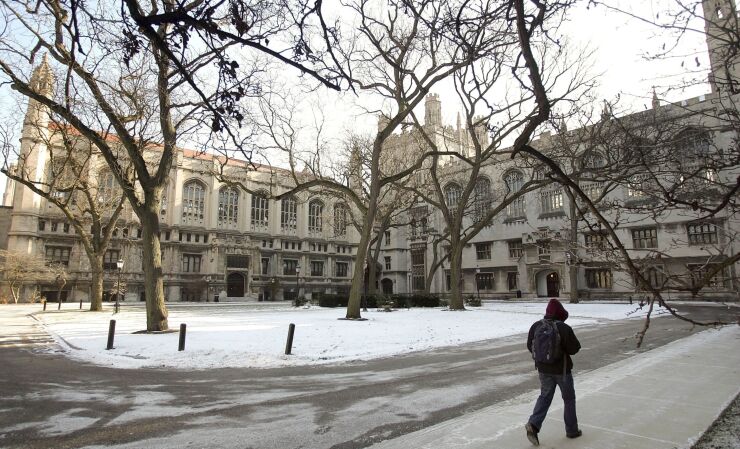The University of Chicago will tap the corporate market this week for a refunding that signals the steep rise of corporate CUSIP deals in not-for-profit sectors last year shows no signs of slowing down.
The double-A rated university will take indications of interest Tuesday on $610 million of refunding taxable bonds with a corporate CUSIP and then price them on Wednesday along with $218 million of tax-exempt refunding bonds with a forward delivery structure.
Citigroup Global Markets Inc. is the senior manager with Loop Capital Markets LLC and RBC Capital Markets serving as co-senior managers. The Illinois Finance Authority is serving as conduit on the tax-exempts.

The last year has seen a dramatic increase in corporate CUSIP deals in the healthcare, non-profit and higher education sectors with the structure offering those sectors — all hard hit by the COVID-19 pandemic — more flexibility to manage debt.
Corporate CUSIPs alone in 2020 blew up 223% over 2019 and landed at more than $40 billion for the year, according to data from IHS Markit data. If the market adds in that figure, the total annual issuance in 2020 was well above $500 billion.
Issuers who have tapped that market have been able to come at tighter spreads relative to exempts. There is tremendous demand for investment grade corporate bonds and spreads there have gotten tighter adding to the appeal from the buy side.
For borrowers, corporate CUSIPs offer diversity as the larger not-for-profits consider how best to manage their balance sheets.
Proceed use is also a factor for borrowers.
"For those issuers, especially a private university, if they borrow through the exempt market, they’re really restricted about where they use the money," said Patrick Luby, municipal strategist at CreditSights said broadly of corporate CUSIPs. "In that sense, the corporate CUSIP deal makes more sense to allow for flexibility of use of proceeds."
Large household names such as Stanford, Georgetown and Notre Dame tapped the corporate CUSIP market because of a broadened investor base.
"It's yet another financing source, whether it's taxable munis or municipal issuers using corporate CUSIPs, if you're a borrower, you're going to look for the lowest cost of capital," said Stephen Winterstein, head of municipal fixed income at MarketAxess. "The surge is a positive for the market. It shows that the market can pivot to these other venues for issuers. The market is availing itself to this diversification."
Seeing more foreign interest in munis, MarketAxess
Really, it is part of the globalization of U.S. infrastructure investment, Winterstein said. By tapping the corporate market, it is "extending the reach to the lending side and makes capital more mobile."
The University of Chicago has used swaps, forward refundings, and taxables to capitalize on market rates in recent years.
As part of the financing, UChicago is considering a swaption program for the possible future refunding of portions of the series 2014A and series 2015A bonds in an effort to lock in interest rates and hedge against future interest rate increases. If rates remain low, UChicago would be out the estimated $3.4 million initial transaction cost, according to Fitch Ratings. If rates rise, the university could execute the swaption and generate future savings. UChicago owns the option, so the decision of whether or not to execute the swaption is the university's call. No collateral posting is included.
As issuers began flocking to taxable structures in the aftermath of the 2017 federal tax overhaul that eliminated advance refundings, UChicago Chief Financial Officer Ivan Samstein said during a 2019 conference that he likes the structure because it avoids tax rules but he also takes into consideration the value of call feature differences between the municipal and corporate markets.
The highly selective school has suffered pandemic wounds with a $208 million operating loss last year and a $150 million loss built into 2021.
Fitch Ratings and Moody's Investors Service last year moved their
The university, with 16,800 full time students including about 7,000 undergraduates, shifted to remote learning last March and then shifted to a hybrid, in-person, on-campus learning this past fall. Dorms are open but are limited to 46% capacity.





